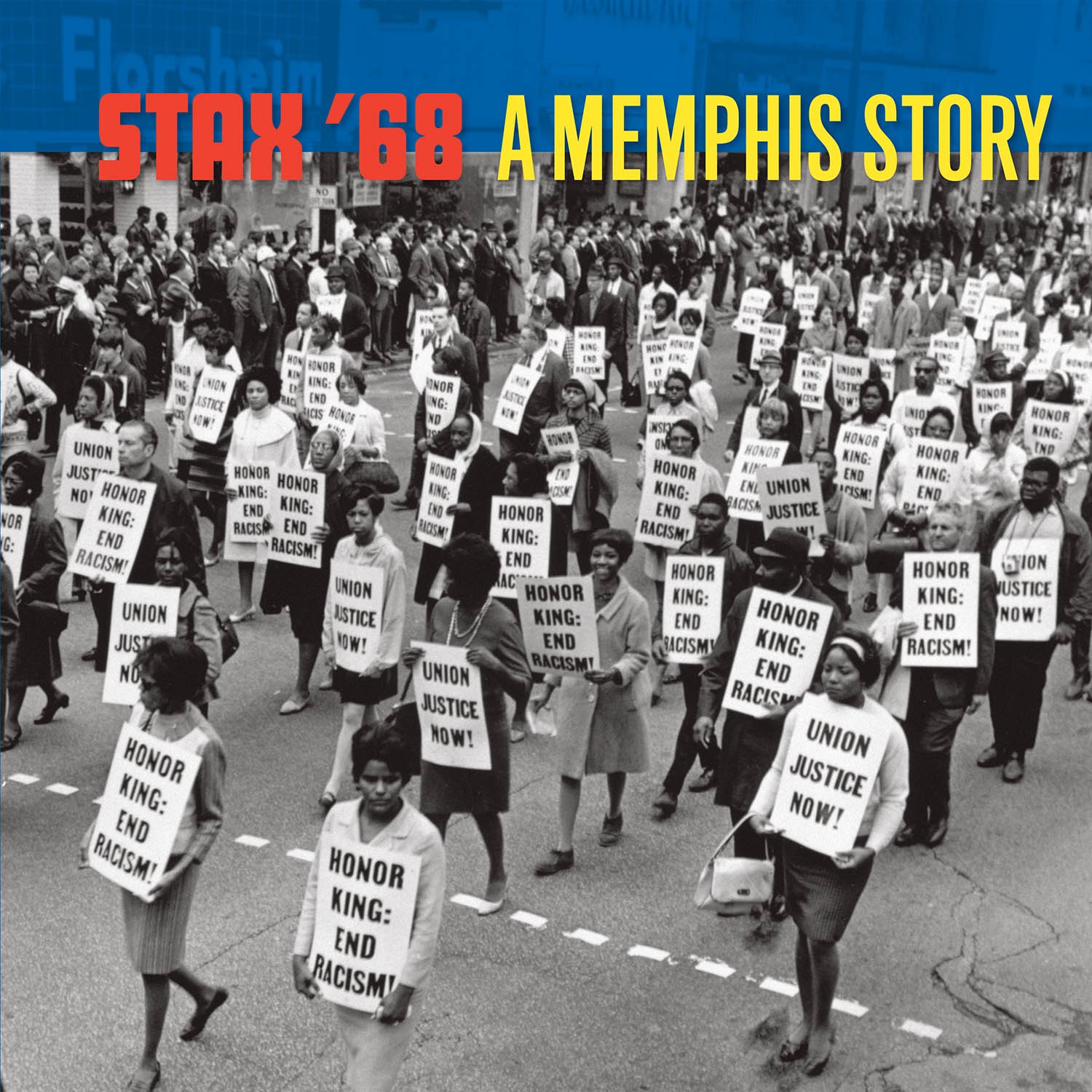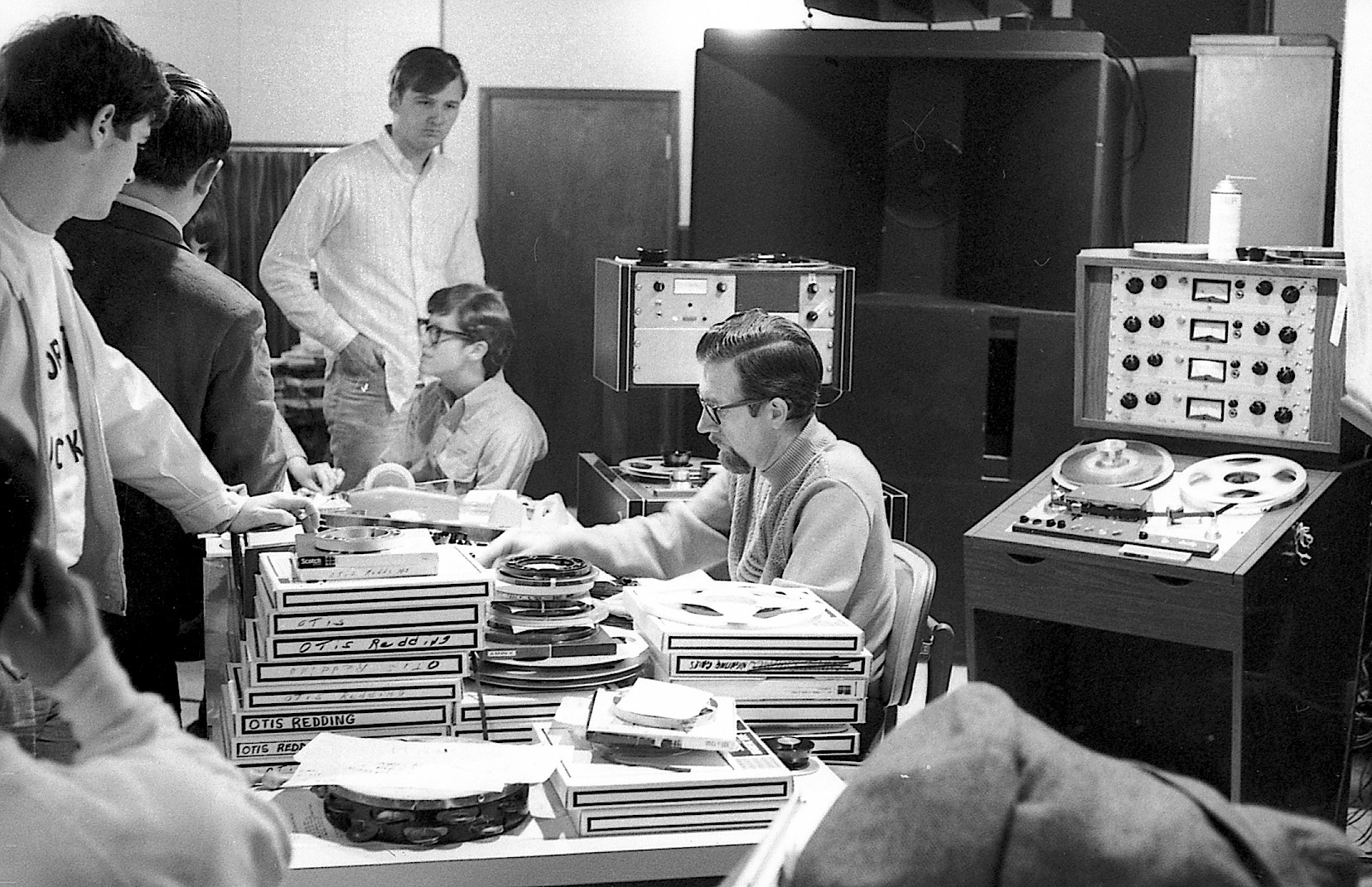
1968 was an epochal year for Memphis, for America, and for the world. Flip through the book 1968: Marching Through the Streets, by Tariq Ali and Susan Watkins, and you’ll see listed, for every month of the year, hot spots of protest and government clampdowns by the dozens across the globe. America was deep in the Vietnam War, and resistance was rising to a fever pitch. Like today, it must have been easy to imagine that civilization itself was coming apart at the seams.
For Memphis, and its music industry leader, Stax Records, these existential threats were compounded by local circumstances. Sanitation workers, arguably the lowest on the rungs of the South’s caste system, were on strike, protesting low pay and two of their cohort being crushed to death by obsolete equipment. Naturally, the untended garbage, like the city’s decadent rot of racial baggage, began to stink. Inside the Stax offices, they were still reeling from the double bombshells of late ’67: the loss of Otis Redding and many of the Bar-Kays in a horrific plane crash; and the label’s break with Atlantic Records, who claimed not only their star performers, Sam & Dave, but Stax’s entire back catalog.
2018 has been rife with memorials to that year, chiefly in remembrance of Dr. Martin Luther King, Jr., who’s assassination came during his support of those striking workers. But this past February, Al Bell, Dr. Zandria Robinson, and Marco Pavé joined in a panel discussion of the year 1968 more generally, and how it compares to our present world. Of course, Dr. King figured heavily in the conversation, but so did Stax’s need to compensate for lost recordings and artists that year, and the way such a project resonated with Dr. King’s message of black entrepreneurial empowerment and independence.
It was all too clear, as Bell described it, that Stax had to fight for its life by immediately creating a whole new catalog. And half a century later, that catalog lives on.

Now, packaged together for the first time, comes a retrospective of all the rich and varied music Stax created as it shifted into overdrive that year. It was a singles-oriented label, of course, and that’s reflected here. Stax ’68: A Memphis Story (Craft Recordings) showcases the A- and B-sides of every single released over those twelve pivotal months. While most of the tracks have been released digitally in either The Complete Stax/Volt Singles, 1959-1968 – Volume 1 or Stax Singles 4: Rarities & The Best Of The Rest, there is something powerful in hearing these tracks all in one place.
And for the true completist, there are even two tracks that have not appeared on any previous digital compilations: “Used to Be Love” by Lindell Hill and “Going Back To Memphis” by Billy Lee Riley. The Memphis Flyer is honored to premiere the latter here today.
Stax ’68 Compilation to Drop Soon: World Premiere of ‘Going Back to Memphis’
Riley was one of Sun Records’ rockabilly stars in the previous decade, scoring hits like “Flyin’ Saucers Rock & Roll” and “Red Hot.” This track for Stax, however, is pounding blue-eyed soul, more like Tony Joe White with the Memphis Horns. And this is representative of what Stax was reaching for in 1968, as they sought to diversify. Earlier subsidiary labels like Volt and Hip were given new attention, and others, such as Enterprise, were created. Riley’s release on Hip marked his return after perhaps the longest and most fortuitous AWOL in music history. In 1962, Riley’s first session for the label fizzled out when the artist inexplicably disappeared. The rhythm section made the most of it anyway, and the B-side they cut that day, “Green Onions,” helped put Stax on the map.
Six years later, Riley was part of the Stax family’s wider reach, which also included an Arkansas boy who would later score hits with George Harrison and Eric Clapton: Bobby Whitlock. He had risen up through the garage and frat band scenes, and Stax was his ticket to wider recognition. The Memphis Nomads, aka the Poor Little Rich Kids, are another group to sprout from that scene. And then there were the white artists who were so immersed in classic soul that they brought there own convincing variations on it to the label, as with Linda Lyndell, whose “What a Man” was later lifted by Salt n’ Pepa.
Other diverse sounds are showcased here as well, including jazz, as in the Eddie Henderson Quintet’s transformation of “Georgy Girl,” or Isaac Hayes’ groovy “Precious Precious.” But ultimately, such diversity is overshadowed by the raw soul that was Stax’s specialty, and there’s plenty of that here. In retrospect, it’s stunning that a single year, begun in desperation, brought us Otis Redding’s “(Sittin’ On) The Dock of the Bay,” Sam and Dave’s “I Thank You,” Eddie Floyd’s “I’ve Never Found a Girl (To Love Me Like You Do),” Booker T. and the MGs’ “Soul Limbo,” or Johnny Taylor’s “Who’s Making Love.”
And, as with Stax Singles 4: Rarities & The Best Of The Rest, the B-sides offer up plenty of gems as well, from Otis Redding’s “Sweet Lorene,” a personal favorite, to the girl group sound of the Goodees’ “Condition Red.” And, this being 1968, the turmoil of the era’s topical issues is echoed in everything from William Bell’s Otis memorial, “Tribute to a King,” to the Staple Singers’ classic “Long March to D.C.” The political content is further raised by historically informed liner notes from Andria Lisle, Robert Gordon, and Steve Greenberg.
Parallel with this release, we in Memphis also reap the benefits of two exhibits that help us journey back to those troubled times. The Stax Museum of American Soul Music currently features The Sound of ’68, with photographs and mementos that document life inside Studio A at Stax Records as seen by Don Nix, an early member of the Stax family who later became a songwriter, producer, and solo artists for the label, and Alan Copeland, the drummer for the Poor Little Rich Kids.
 Alan Copeland
Alan Copeland
Jim Stewart with members of the band Poor Little Rich Kids
And be sure to also see Give a Damn! Music + Activism at Stax Records, the foundation’s exhibit now installed at Crosstown Arts. It presents artifacts of the label’s increasingly political content, culminating in the desk and work space of Black Moses himself, Isaac Hayes.
 Ronnie Booze
Ronnie Booze
Isaac Hayes’ epic desk
Still, all activism aside, and returning to the music at hand, the chief topic echoing through Stax ’68: A Memphis Story continues to be love and it’s many permutations, from feel-good stompers like “Lovey Dovey,” by Otis Redding and Carla Thomas, to William Bell’s classic “I Forgot to Be Your Lover.” For all the crises of 1968, Stax soldiered on with its trademark celebratory vibes. And that may be what still helps us the most through these dark days, fifty years on.
Note that pre-ordering the set, which is released on October 19, will give you access to several gratis tracks: “Long Walk to D.C.” by The Staple Singers, “Used to Be Love” by Lindell Hill, “Send Peace and Harmony Home” by Shirley Walton, and today’s premiere track, “Going Back to Memphis” by Billy Lee Riley, which will be available outside of the Flyer‘s site on October 12th.